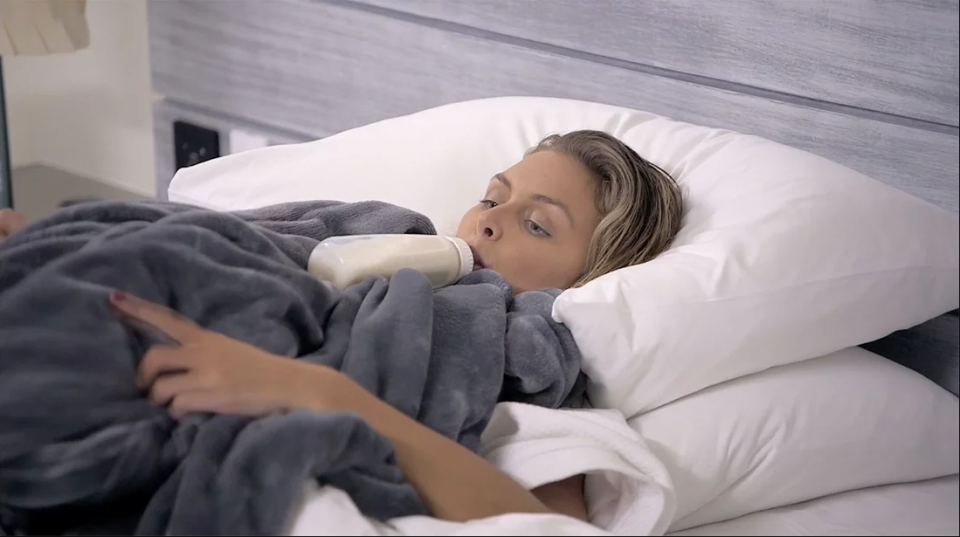This reality star drinks milk from a baby bottle before bed — is that weird or what?
Vanderpump Rules fans were surprised Monday night when one of the show’s stars revealed that she sometimes likes to drink warm milk from a baby bottle before bed.
Lala Kent and her co-star Scheana Marie shared a hotel room during a trip to Mexico during the episode, and at bedtime Kent revealed her quirky habit. “What are you doing? You’re taking forever,” Marie asked Kent from her bed. “I’m making my baba,” Kent replied, before placing a baby bottle filled with milk and honey on her bedside table.

In an on-camera interview, Marie admitted that she travels everywhere with a stuffed frog that has a special meaning for her but added, “I don’t know any grown women who need a ‘baba’ to go to bedtime.” The camera then went back to Kent, who explained just how she likes to have her bottle (while watching her favorite show, with the bottle propped up on a blanket in front of her) before proceeding to drink it like a baby.
Kent was pretty unapologetic about her habit in a later interview. “I’m on a very low dose of my anti-anxiety medication, so when I do feel like my heart’s beating a little fast, I need my baba, and I put warm milk and honey in it,” she explained. “It soothes me, like I’m a baby.”
People had strong reactions about this on Twitter. Some were supportive, while others thought it was pretty unusual:
Wait. Lala has a …. BaBa? What the A.F.? #PumpRules #FemalePeterPan pic.twitter.com/5fSzAWdMAB
— DramaFollower (@DramaFollower) March 26, 2018
I am here for @lala_kent's baba. #PumpRules
— Julia Ruybalid (@juleskathryn) March 27, 2018
OMG @lala_kent is SOOOO adorable with her baba and blanky! I think it is so cute!
— Tara Rubin (@tara_j_rubin) March 27, 2018
#PumpRules
My two month old daughter falling asleep with her baba: cute.
Lala falling asleep with a baba: pic.twitter.com/uCoGWlXGCA— christopher gomez (@chrisgsound) March 27, 2018
I’m not sure if I love or hate that @lala_kent drinks warm milk out of a bottle before bed. And refers to it as her baba
— Duh (@amanduhpants) March 27, 2018
While plenty of people thought Kent’s baba was “weird,” it’s actually pretty common for people to have some kind of regressive self-soothing behavior, John Mayer, author of Family Fit: Find Your Balance in Life, tells Yahoo Lifestyle. Sucking warm milk from a bottle isn’t super-common, but many people may touch themselves in a comforting way, wear certain types of clothes that are soothing, or want hugs from loved ones in a similar vein, he points out. Comfort food, comforting smells, and certain textures can also act as self-soothing techniques that remind someone of their childhood, Greta Hirsch, clinical director at the Ross Center for Anxiety Disorders, tells Yahoo Lifestyle.
But reverting to actual childlike behavior can be tricky. Often, this happens when someone has anxiety over an old fear that they struggled with in childhood, Hirsch says. “Usually the way that I will work with the person is to try to have a dialogue with the adult part of them,” she says. “I might say, ‘I understand that you’re afraid, but you’re no longer alone.’” That way, she can help the patient figure out the source of their anxiety and be able to have the adult part of themselves soothe their inner child without actually reverting to childlike behavior. The latter is “not the way you want to have someone cope with something,” Hirsch says.
Reverting to childlike behavior is a “primitive coping mechanism” and may not work as well for big anxieties and fears like bills, taxes, and stress at work, Mayer says. “In the face of these anxieties, we need more mature and sophisticated coping mechanisms such as problem solving and rationalization,” he says. And, Mayer points out, there can be a social cost. “If people know about these coping mechanisms, they might react negatively, and you may be embarrassed,” he says.
The best way to find out if your coping mechanisms are too regressive is if they actually end up making you feel bad. “That is, they make your anxieties worse or result in consequences that erase all benefit from the coping mechanisms, even if that [consequence] is social embarrassment,” Mayer says.
Another gauge: if anyone is being hurt by them (yourself included). “Generally speaking, if it doesn’t hurt anyone else or yourself, it’s OK,” Mayra Mendez, program coordinator for intellectual and developmental disabilities and mental health services at Providence Saint John’s Child and Family Development Center in Santa Monica, Calif., tells Yahoo Lifestyle. “If you’re still able to cope as a full-fledged adult and it’s not causing a problem with your functioning, interacting with people, or problem solving, it’s probably fine.”
If you’re not, that’s a problem. It doesn’t mean you shouldn’t have self-soothing mechanisms, Hirsch says — you should just try to make them be somewhat adult-like, if possible, so that you can use them in the real world too. “You would not want self-soothing mechanisms to be completely regressed to childhood,” she says.
Read more from Yahoo Lifestyle:
Cleo Wade shares how daily mantras can help overcome anxiety
How to cope with chronic illness: ‘Your disease does not define you’
Follow us on Instagram, Facebook, and Twitter for nonstop inspiration delivered fresh to your feed, every day.

